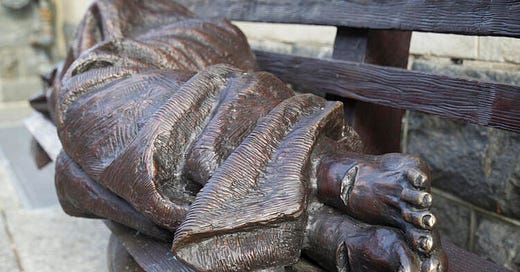Ism’s’
200 Words: Each person is made in the image and likeness of God and Jesus of Nazareth now identifies himself with those in special need.
The Feast of Christ the King was instituted by Pope Pius XI in 1925. It combats all the ism’s:
Communism, Socialism, Nazism, Capitalism, Consumerism, Hedonism, Woke-ism, etc.
So many ideologies, offering utopian solutions to our human community. Paradoxically – truthfully – the word utopia means ‘no place.’
There is only one utopian community – eternal, resurrected life with the Blessed Trinity – and we are working and walking towards it.
Are we ‘walking the walk’?
I was hungry and you fed me. I was thirsty and you gave me drink (Matthew 25).
Each person is made in the image and likeness of God and Jesus of Nazareth now identifies himself with those in special need.
In fact, there are four pillars of a free and fair society:
The freedom and dignity of the human person
The pursuit and maintenance of the common good.
The principle of subsidiarity
The principle of solidarity.
The Church’s developed social teaching does not promise utopia here and now of course, but it does ensure far greater freedom and fairness than do any of the isms.
It’s all about moving us from self-interest to public interest, a particular challenge in our time with minority groups demanding special privileges.
Amen.



Well said Father.
I like the idea of needing to participate. A lot of people make demands and feel entitled without actually participating or contributing with the gifts been given to them. This is not always through faults of their own as much of it is ingrained in them by the consumerist culture, or many of the other “isms”.
Lots of ideologies all around, but none offers an eternal destination. Only Christ offers that.
I’ll be keeping those 4 pillars in mind. Thank you for sharing.
Another wonderful piece Fr. Tony. I admire your ability to cut through to the essence of big topics, such as the ‘isms’, so succinctly. And you’re right, the Church doesn’t promise utopia. But what is available to all is the rich history of Catholic mysticism, from the desert fathers and mothers to twentieth century contemplates such as Evelyn Underhill, Caryll Houselander and Thomas Merton. Our life attention is mostly absorbed into the minutia of diurnal incidence. For we have bills to pay, children to raise and bosses to please. We can, understandably, lose sight of the Divine. We move like slaves to the rhythm set by the demands of others, oblivious to the moment-to-moment, grace-filled life that is the invitation of the Holy Spirit.
Both Merton and Houselander experienced seeing God in everything. Once, when he was in Louisville, Merton had a mystical experience that he described thus: “[I] was suddenly overwhelmed with the realization that I loved all those people, the people walking the streets of the city. They were mine and I theirs, that we could not be alien to one another even though we were total strangers. It was like waking from a dream of separateness, of spurious self-isolation in a special world, the world of renunciation and supposed holiness.”
Although utopianism is often described as the belief in, or pursuit of, a state in which everything is perfect, maybe the new type of utopia is one in which, as Karl Rahner says, “we, the devout Christian of the future, will either be a 'mystic'—someone who has 'experienced something'—or will cease to be anything at all.” Such a beholding, such a lifting of consciousness from a self-centred to a God-centred world, is of the essence of the new utopia.